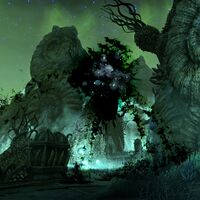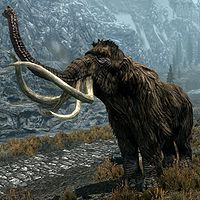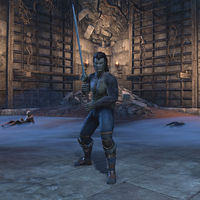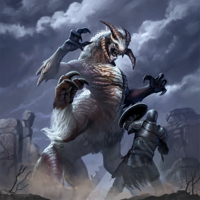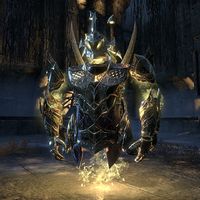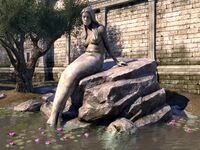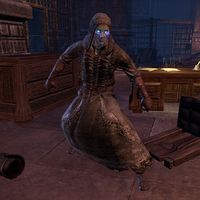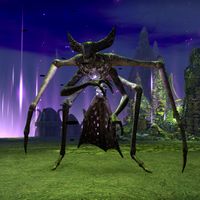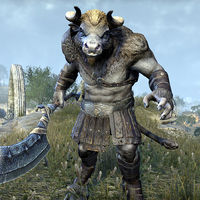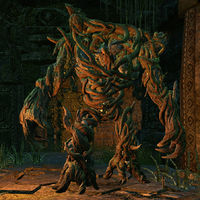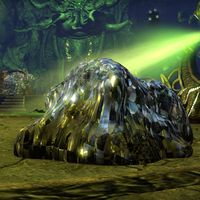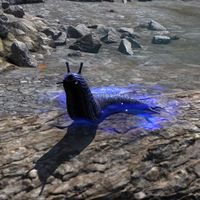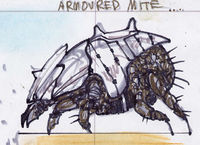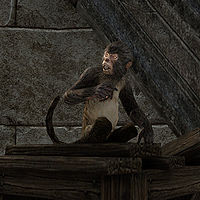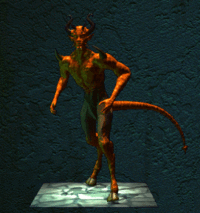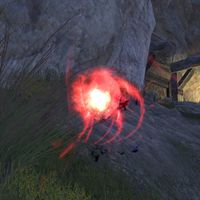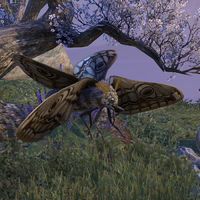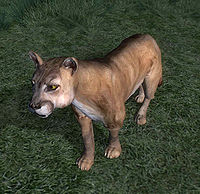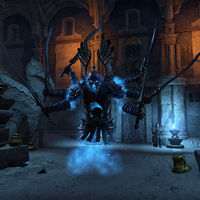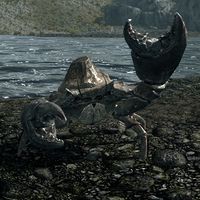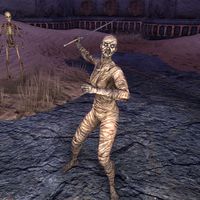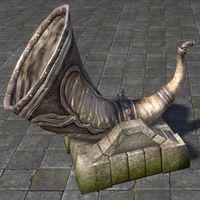Lore:Bestiary M
Magpie[edit]
Magpies are trainable birds that are kept as pets. They are oftened trained to collect shiny objects for their masters.[1] Moorpecker Magpies are an intelligent and vain species prized by scholars and mages alike for their keen instincts and trainability. The birds can be huffy and prone to temper tantrums when not rewarded with shiny objects for their work.[2]
Maligraphy[edit]
Maligraphies are Daedric creatures composed of vivified ink. They are described as being myths from books come to life, and as such can take on virtually any form. These forms can include mortals of different races and affiliations, other daedric entities, animals, nature spirits, dragons, shades, celestials, undead, and even Dwemer or clockwork constructs. They can replicate not only the physical appearance of the forms they copy but also the accompanying equipment, including powerful artifacts. They were summoned by Tho'at Replicanum in the Infinite Archive. Each maligraphy's strength depended on the page they were created from, translating the power in the contents of the page to physical prowess.
Though classified as Daedra nominally, they are truly pieces of Tho'at without individuality. They were created from fragments of her nymic combined with the ink of the archive's tomes via Daedric magic. Due to the nature of the archive, a potentially infinite amount of maligraphies may have formed, though they are normally unable to sustain themselves outside of the archive, some have found a way to escape its confines.
Commonly, a variety of maligraphies are found alongside their specific stronger subtype, the Fabled. Another type of very powerful maligraphy was known as the Marauder.
Mammoth[edit]
Mammoths are large woolly beasts that are generally non-hostile unless provoked, they are most commonly found near giants in herds. Their distribution varies, with them being a common sight across the tundras of Skyrim, the Wrothgarian Mountains, northern Cyrodiil, and the western regions of Valenwood. The common Tundra Mammoths of Skyrim and Cyrodiil possess two or four tusks, though they only have two when young. The Timber Mammoths of Valenwood and miniature Pocket Mammoths of the Orcs only have two tusks.
While it's commonly believed that giants herd mammoths, scholars have observed that their relationship is based more on mutual respect. They are seemingly able to communicate with mammoths, and protect them fiercely. In return, giants receive companionship and milk, which they process into cheese. Mammoths belonging to giants have markings on their tusks. The two have a protective relationship, with giants protecting them from anything that would do harm to the mammoths, and conversely, tamed mammoths will attack anything that threatens the giant.
They are commonly hunted for their meat and ivory tusks, with the tusks being very valuable. The meat of one mammoth can feed many for a whole month. Powdered mammoth tusk can be used in alchemy, but only the giants know how to grind the incredibly hard tusks down into powder, making the ingredient rare. During the mid-Second Era, baby mammoth fur was said to be much sought after in Morrowind, but exporting it from Skyrim was illegal. Reachfolk were known to utilize mammoths in siege warfare and as mounts.
- See also: Elephant
Man-Beast[edit]
Man-Beasts are individuals afflicted with a kind of Lycanthropy of which very little is known. Those afflicted with this condition appear beast-like, even when they are not in beast form. Their bodies are covered in light brown fur, and they have orange eyes. Man-Beasts are observed to be more intelligent and less primal than those in beast form, and are able to cast spells and use weapons. They lurk in the shadows waiting for their victims, and have vicious claws for tearing at their prey. The term man beast (without the dash) is used to describe werebeasts as a whole.
- See also: Werewolf Lord
Mantikora[edit]
Mantikoras are unnatural composite creatures, artificially created to serve as soldiers by the Scaled Court circa 2E 572. They were created via their experiments with nirncrux, alchemy, and ritualistic magics. They combine the traits of numerous predators, such as crocodiles, welwas, scorpions, and specially bred wamasu. Additionally, captured Men and Mer were also utilized to give the creatures their sapience. Mantikoras were created to be used in the Serpent's plot to revert Tamriel back to the chaos of the Dawn Era. One was even possessed by him to battle his enemies.
Mantikoras are large, powerful, and exceptionally intelligent - and that makes them extremely dangerous. They are intelligent enough to communicate and barter with other races. They are aggressive creatures that like the thrill of the hunt, and they never kill their victim quickly to enjoy their fun. They typically wield huge javelins in combat, though they are also capable of producing a deadly venom. Their venom can cook their victims from the inside, leaving them as venom-charred husks. The venom of a specific Mantikora, Tapupezu Azzida, was used as a supplement in an illegal narcotic known as Daze in Fargrave. While Daedra could survive it, it is lethal to mortals, though regular Mantikora venom is devasting even to Daedra.
Only certain Mantikoras, known as progenitors, are created with the ability to breed.
Mantis[edit]
Mantises are a species of carnivorous insects. Lantern Mantis plants are named after them due to their close resemblance to the insects.[3] Elytra are an insectoid species that also resemble mantises.
Marmot[edit]
Marmots are rodents native to the cliffs and escarpments of east central Elsweyr. They share this habitat with goats and senche-cougars, the latter of which preys upon them.[4]
- See also: Prairie Dog and Woodchuck
Marsh Giant[edit]
Marsh Giants are a giant-like race native to Black Marsh. These manifestations of nature are a form of woodland spirit considered "cousins" to spriggans. They are not related to the common giants of Skyrim, but they do share their size and pastoral activities. Their exact level of intelligence is unknown due to limited interactions. However, the Hist apparently have a long and acrimonious history with the Marsh Giants, and urge the Argonians to avoid the creatures if they can.
They play an important role in Blackwood's ecosystem by knocking down dead trees, turning the soil and making room for younger vegetation to grow. This encourages the growth of mosses and suppresses the development of invasive fungi. Marsh giants also hinder loggers, contribute to avian diversity and ward off certain predators, such as feral cats.
Meadowlark[edit]
Meadowlarks are a type of songbird,[5] and a dye was named after the West Weald Meadowlark.[6] Idioms involving meadowlarks were in use in the Summerset Isles.[5]
- See also: Lark
Melusanae[edit]
The Melusanae is a mythical feminine creature said to inhabit Stros M'Kai. According to legend, they lure ships to wreck on jagged shoals, then consume the souls of those aboard. Scholars regard them as fictitious folk tales, particularly when compared to the similar, credibly accounted Wispmother of Skyrim.[7]
Meridian Guardian[edit]
Meridian guardians (also referred to as temple guardians or simply guardians) are Daedric servants of the Daedric Prince Meridia. They take the form of an Auroran suit of armor with two or four arms and blades. In certain circumstances, the Purified may be turned into Meridian Guardians, though the nature of transformed guardians is different from those who are proper Daedra. They wield powers of ice, lighting, fire and light, and command Aurorans in battle. They are more powerful in the Colored Rooms, and can transport people there against their will.
Mermaid[edit]
Mermaids (also called the Selkie) are mythical creatures with a presence in the Abecean Sea. They resemble young women with a long fish tail instead of legs, but the nature of these creatures is unknown.
Mimic[edit]
Mimics are small, winged creatures that inhabit Valenwood, they are capable of regurgitating any words that they overhear. They are described by famed author Waughin Jarth as legless creatures with crimson eyes and plump bellies, darting through the air like sparks from a fire.[8] The Bosmer use spells to attract them as part of the process for brewing beer from meat.[9][UOL 1]
Mind-Shriven[edit]
Mind-Shriven are mortals or Daedra who have had their will and mentality stolen by Molag Bal, the Daedric Prince of Domination and Enslavement. They are not to be confused with Soul-Shriven, dead mortals whose souls have been stolen by Bal and replaced by a Daedric vestige. Unlike these "vestiges", Mind-Shriven are not dead and have retained their mortal bodies.
Becoming a Mind-Shriven involves drinking a poison known as the Blood of Coldharbour, which will slowly begin to rob the imbiber of their willpower. This process can be delayed through alchemy, but not halted. Mind-Shriven can be identified by the wispy blue veins of cold fire that emanate from their veins, and their glowing blue eyes. Once the transformation is complete, the victim takes on a lifeless, pallid grey tone and becomes mindlessly aggressive. Some of the afflicted experience side effects apart from the intended effect, such as their vision being tinted blue as their eyes change. The process is not just effective on the mortal races, as horses and wolves have been transformed into Mind-Shriven. Even lesser Daedra can become Mind-Shriven, as in the case of Mind-Shriven Scamps, unusual specimens that are often found in the company of other Mind-Shriven creatures.
Mind Terror[edit]
Mind Terrors (also known as Walking Nightmares) are powerful Daedra that serve Vaermina. They are said to be made of warped dreams incarnate, with some being said to be the dreams of a Daedric Prince made manifest.[10] They have insectoid legs and eyeless skulls.
Minotaur[edit]
Minotaurs, also called man-bulls or bull-men, are a species of beastfolk native to Cyrodiil with the body of a man and the head of a bull. During the First Era, they were said to have symbolized the Alessian Empire, but in later eras became more commonly perceived as savage monsters by the people of Tamriel.
They have thick grey or sometimes brown or red hide and fur, and large curved horns. Some Minotaurs clothe themselves in a simple loincloth and shawl or wear nose-rings. Others wear intricate leather armor, and some prefer to be completely naked. They are most commonly found in the Blackwood, Colovian Highlands, Great Forest and the Gold Coast regions of Cyrodiil, as well as The Scar of Elsweyr, the Reach, and in ancient times across Bangkorai and Valenwood.
For more information, see the main lore article.
Miregaunt[edit]
Miregaunts are large tree-like creatures that can be found across Murkmire. According to Argonian folklore, they have existed as long as the Argonians themselves. Some believe them to be the "wrath of Murkmire". Most Argonians believe them to be related to the Hist in some way. Some tribes believe that the Hist trees call forth a portion of the swamp to accomplish a specific task, either guarding an area, defending a place, or taking vengeance on someone or something that hurt or hampered the Hist in some way. Others seem to indicate that a miregaunt is an unintended by-product of some unknown Hist activity, called forth by accident and set loose with no specific purpose in mind.
Although they consist mainly of plant substance, they sometimes incorporate other materials into their shape, including mud, stone, vines, and even pieces of ancient architecture. They bear some small resemblance to lurchers and similar creatures found in other parts of Tamriel, but in all other respects they appear totally unique creatures.
Every miregaunt has a large cavity in its mid-section. Sometimes an encountered miregaunt's cavity is empty. Other times a random piece of stone or other detritus fills the empty space. In rare cases, something valuable rests within the miregaunt, such as a precious stone, an ancient relic, or even a living creature. The local Argonians believe that these valuable objects have been taken into the miregaunt to purposely protect or imprison them. Miregaunts are part of the land: when one is struck down, it will inevitably come back later.
They have some small resemblance to certain aspects of lurchers and similar creatures found in other parts of Tamriel, but in all other respects they appear totally unique creatures. Trellis sentinels, tree-like creatures that ressemble Miregaunts, are found on Earthen Root Enclave. They were responsible for the protection and preservation of a nature spirit known as the Spirit of Root, and the Deeproot within the Earthen Root Enclave. Wooden constructs ressembling miregaunts or trellis sentinels are also known to exist.
Mirrorplasm[edit]
Mirrorplasms are a type of crystalline Daedra that appear as blobs of living glass, similar in shape to voriplasms. They are servants of the forgotten Daedric Prince Ithelia, and can generally be found anywhere she or the forces of Mirrormoor have exerted their influence.
- See also: Glass Atronach
Mirrorworm[edit]
Mirrorworms are small, harmless blue Daedra that resemble large slugs. They are native to Mirrormoor, a lost Daedric realm. They can also be found in Fargrave, a shattered fragment of that realm. The creature's soft form is protected by glistening reflective scales that also serve to confuse and intimidate would-be predators.[11] They are creations of the forgotten Daedric Prince Ithelia, and can generally be found wherever she has exerted her influence. Mirrorworms could be found throughout the West Weald circa 2E 582 during Mirrormoor's attempted invasion.[12]
Mistman[edit]
Mistmen are floating, ghostly undead of the Soul Guard found within the Soul Cairn. They are said to "blend in the glory of the transcendent spirit." Therefore, they see death as a cleansing of fears and shame, and a state of serenity. They are content with the Soul Cairn, which they view as a refuge for peace and love. They are described as collective manifestations of happy spirits that are in service to the Ideal Masters.[13][14] Mistmen have the ability to cast elemental destruction magic, though they will resort to punching should they run out of magicka.
Mite[edit]
Mites are tiny parasitic arachnids that live in dirt.[15] Druids are known to put mites in their ale.[16] Ash mites can be found in Morrowind and are known to infest Nix-Hounds and Kwama.[17][18] Bog mites can be found in Black Marsh and can infest Argonians.[19] Argonians are known to use scale scrapers to remove them.[20] Armored mites are a giant variety from the Shivering Isles that were used as mounts by Knights of Order.[UOL 2]
Mock Turtle[edit]
The Mock Turtle is a rare species of horned giant Great Turtle that have been known to exist since at least 2E 582, in a place beyond the Weir Gate. The species is the source of the famous Mock Turtle soup, the "Soup of Kings". Despite the evidence however, most scholars have dismissed the existence of Mock Turtles as "pure nonsense".
Mole[edit]
Moles are subterranean animals known for having poor eyesight. Moles were the namesake of various inns and taverns in the late Third Era.[21] Mud-moles are a species of mole native to Black Marsh.[22]
Molmor[edit]
The Molmor was the most powerful of the numerous colossal sea creatures unleashed by the Sloads upon the Systres Archipelago during the Thrassian War, a fierce conflict between the Sloads of Thras and the All Flags Navy. Tales describe the Molmor in various ways, recounting that it resembled a massive whale, an octopus with grasping tentacles, or even "veritable forests of sharp spines, each longer than the lance of a knight".
- See also: Ithguleoir
Monkey[edit]
Monkeys are small forest-dwelling simians that are kept as exotic pets throughout Tamriel. They have a fondness for bananas.[23] Imgakin are one species of monkey, while baboons are another. The Tang Mo have been described as a "monkey-folk", but it is unknown if they are in any way related. Similarly, Hobs have been regularly described as monkey-like.
Moose[edit]
Moose are a large member of the deer family with tough but dull horns.[24] They make for strong and reliable mounts, and are used as such in Daggerfall.[25] They are considered an impressive hunting kill; their remains are used for leather or mounted taxidermy.[26]
Morphoid Daedra[edit]
Morphoid Daedra are race of horned Lesser Daedra. They are described as unimaginative thugs of average or feeble intelligence. Being trusting and lovable in a bestial sort of way.[27] They have been known to serve Mehrunes Dagon, with many being members of Xivilai Moath's clan. Many were stationed in the Soul Cairn during Mehrunes Dagon's campaign to invade the Battlespire. Morphoid Daedra see themselves as superior to Scamps and Vermai.[28]
Mosquito[edit]
Mosquitoes are minuscule insects which can be found across Tamriel.[29][30][31] They possess delicate eyebrows,[32] a thorax, and a proboscis[33] which they use to bite.[34] Kotu Gava are a giant species of mosquito.[33][35]
Mote[edit]
Motes are entities that take on the shape of orbs composed of magical energies. They were thought to possess varying degrees of autonomy, with some being described as bolder than others. Motes can exhibit heightened aggression when specific magics disrupt them or the spirit who commands them. Motes are attracted to locations linked with magical energies, like Tor Draioch. Certain motes possess the capability to change the appearance of individuals and animals using illusion magic, while others can actively control minds and change their actual shapes. In certain stories, motes are described as remnants of ancient spirits.
- See also: Sprite, Will-o-the-Wisp, and Wisp
Moth[edit]
Moths are a type of flying insect similar to butterflies that are valued for both alchemical reasons and cultural reasons. Their larvae are known as caterpillars.
Mountain Lion[edit]
Mountain lions (also known as pumas)[36] are fast and vicious feline predators that roam the wilderness of Cyrodiil. The valley Lion's Den in Skyrim was a historical breeding ground for mountain lions, which the Nedes of the late Merethic Era often hunted for pelts. Over the years, locals avoided the area in favor of harvesting furs from domestic livestock.[37] Mountain lion pelts are still quite valuable, and can be used in rituals to summon Molag Bal. They are also captured for use in gladiatorial arenas, such as in the famous Imperial City Arena.[38]
- See also: Lion, Senche-Lion, and Senche-Cougar
Mournful Aegis[edit]
Mournful Aegises are giant suits of armor animated with spirits by powerful Yokudan necromancy. They are similar in appearance to certain Atronachs. Larger aegises will split smaller Mournful Aegises off of them when damaged sufficiently.[39] They are called spirits by some.[40] Some of them were employed as tomb guardians, possessing the ability to engage in basic speech. At least one such guardian was specifically crafted to challenge intruders with specific passphrases or maxims, attacking those who were unable to articulate the correct command.[41]
Mouse[edit]
Mice are small, harmless rodents closely related to rats.[42][43] Like rats, they are often hunted by cats,[44] or kept as pets themselves.[45] They are often fed to gryphon fledgelings.[46] Field mice are a common variety.[47]
- See also: Dormouse
Mudcrab[edit]
The Mudcrab (or Mud Crab) is a common variety of crab capable of camouflaging itself as a small rock. They can be found along every shore and waterway of Tamriel, and are also a common sight underground. They are not typically aggressive unless cornered or provoked. However, if a mudcrab ever gets a taste of meat it becomes a hunter, and may be a threat to livestock. Mudcrabs are usually not dangerous unless they swarm, as they rely solely on their pincers and burrowing abilities in combat. Mudcrabs are capable of stripping a corpse down to its bones in days, which usually takes weeks for lesser crabs. Some mudcrabs can grow to enormous sizes, and rare albino variants are known to exist.
Although they are inquisitive by nature and can be kept as pets, most citizens of Tamriel regard mudcrabs as disgusting vermin. Mudcrabs have been characterized by certain fish enthusiasts as unhappy creatures, "dour and sunless like the soil in which they sleep". Mudcrabs are prized for their sweet crab meat and legs, and their chitin is sometimes used in alchemy.
Mule[edit]
Mules (or pack mules) are equine animals that are ridden and used for carrying large amounts of supplies.[48] They have a reputation for being stubborn and kicking.[49][50] They are the hybrid offspring of a donkey and a horse, and like donkeys, they are also known as asses.[51]
Mummy[edit]
Mummies are a powerful form of undead. The practice of mummification of the honored dead is common in many cultures across Tamriel. This often involves covering the preserved corpse in distinctive cloth wraps; such mummy wrappings can be used in alchemy. Sometimes the body is also fitted with a death mask. Bodies preserved in such a manner are liable to rise from the dead, either due to an inability to pass on or due to the actions of a necromancer. The process of mummification is believed to protect a corpse's ligaments and muscle from the detrimental effects of rot, thereby greatly increasing its durability, stability, and mobility once reanimated.
The first step to creating a mummy is to soak the decaying corpse in a bath of salt or natron for at least one month to halt decay and remove unpleasant odors. More salts may need to be applied in moist climates such as Argonia or Thras if the salt bath becomes saturated. A wide variety of embalming tools can be used to remove the vital organs before or after this process, although some necromancers skip this step as there is little practical reason to do so. Any organs removed during the embalming process are stored separately in crypt jars by many cultures on Tamriel. The next step is to wrap the body in cloth or linen to preserve and protect it. The wrappings and the corpse's desiccation results in a greater stiffness of the body in comparison to zombies, requiring proper necromantic rituals to imbue the mummy with enough strength to move itself. However, the result is a much stronger undead servant who can follow commands with more independence and understanding. Mummification is sometimes carried out on living victims instead of corpses.
Undead mummies require a silver or better weapon to be harmed, and often carry horrible diseases. Those who take a body part from a mummy can be subjected to a "mummy's curse", and will receive nightly hauntings until the mummy is destroyed.
Musk Ox[edit]
A breed of musk ox was once native to Markarth, but was extinct by the Second Era. Its large horns may have been used by Reachmen as warhorns.[52]
Not to be confused with the common Ox or the Nix-Ox.
Muskrat[edit]
Muskrats are a type of rodent that were the namesake of various inns and taverns in the late Third Era.[21]
- See also: Rat
Muskrey[edit]
Muskrey are a species of animal said to inhabit Solstheim's Ensleth Valley. They are commonly hunted by the Skaal. They share their habitat with elk and deer, as they all lick salt by the valley's river.[53]
Mustard-Wing[edit]
Mustard-Wings are a type of bird. A type of dye was named after Tarry Mustard-Wings.[54]
References[edit]
- ^ Striped Senche-Panther Cub pet description in ESO
- ^ Moorpecker Magpie pet description in ESO
- ^ The Elder Scrolls: The Official Survival Guide to Tamriel — Tori Schafer
- ^ Senche-Cougar mount description in ESO
- ^ a b Lauriel's dialogue in ESO: Summerset
- ^ Fledgling: West Weald Meadowlark dye in ESO
- ^ The Wispmother — Mathias Etienne
- ^ A Dance in Fire, Chapter 5 — Waughin Jarth
- ^ On the Brewing of Dark Meat Beer — Anonymous Bosmeri Brewer
- ^ Ordinator Nelyn's dialogue during Tracking Nightmares quest in ESO
- ^ Mirrorworm pet description in ESO
- ^ Mirrorworms in ESO
- ^ Mistmen's dialogue in Battlespire
- ^ Book of Life and Service
- ^ Luna Beriel's dialogue in ESO
- ^ Haidouna's dialogue in ESO
- ^ Nix-Hounds: A Manual for New Owners
- ^ Ridena Devani's dialogue in ESO
- ^ Corporal Ghetul's dialogue in ESO
- ^ Argonian Scale Scraper description in ESO
- ^ a b The names of various Taverns in Daggerfall
- ^ Xukas' dialogue at Alten Meerhleel during Missing in Murkmire in ESO: Murkmire
- ^ Monkeys in ESO
- ^ Bolga's Guide to Galen Beasts — Bolga gra-Bur, Huntswoman of Mistral
- ^ Seaghost Pillion Moose mount description in ESO
- ^ Abandoned Fort pathway prompts in Skyrim Very Special Edition
- ^ Morphoid Daedra description from Elderscrolls.com Archive/Battlespire: Monsters
- ^ Morphoid Daedra dialogue in Battlespire
- ^ Grash's dialogue in ESO
- ^ Captain Rana's dialogue in ESO
- ^ Dungeon Type messages in Daggerfall
- ^ The Armorer's Challenge — Mymophonus
- ^ a b Gilded Toku Gava Ink Pen treasure description in ESO
- ^ Isobel Veloise's dialogue in ESO: High Isle
- ^ ESO Patch Notes
- ^ Body Markings in ESO
- ^ Into the Lion's Den
- ^ Arena Combatants in Oblivion
- ^ Mournful Aegis in ESO
- ^ Naryu's Journal/Hew's Bane — Naryu Virian
- ^ Lakayd the Repentant's dialogue in ESO: Thieves Guild
- ^ The Piper
- ^ Rulings text in Castles
- ^ Zhasim's dialogue in ESO
- ^ Detu-Meeus' dialogue in ESO
- ^ Tanlorin's dialogue in ESO
- ^ Sugarbelly — Azmu-ra
- ^ Condier Ergend's dialogue in ESO
- ^ Jaflinna Snow-bornl's dialogue in ESO
- ^ Ghakorz gro-Morkul's dialogue in ESO
- ^ Vyctorelle's dialogue in ESO
- ^ Horn of the Reachclans description
- ^ Lord of Souls — Greg Keyes
- ^ Fledgling: Tarry Mustard-Wing dye in ESO
Note: The following references are considered to be unofficial sources. They are included to round off this article and may not be authoritative or conclusive.
- ^ The Dreadful Theft of the Sun's Dusk Ale — Rascien Wickersly
- ^ Shivering Isles concept art

